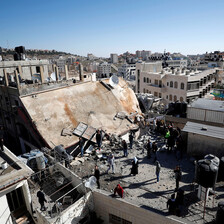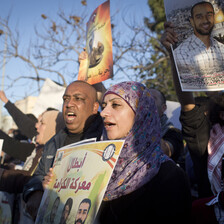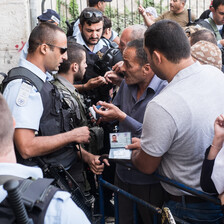The Electronic Intifada 26 December 2015

The Damscus Gate in Jerusalem, where Israel’s draconian punitive measures are aimed at breaking the back of any organized resistance in the occupied city.
APA imagesWhenever Palestinians stand up for their rights in Jerusalem, it is a safe bet that Samer Abu Eisheh will be there. It is hard to imagine a protest near the Damascus Gate — an entrance to the Old City — without his bellowing voice.
It is the 28-year-old’s relentless activism that could sunder him from his home, however. After nearly three months under house arrest, the TV producer and community leader was handed a five-month expulsion order from Jerusalem this week. It was issued by an Israeli district commander.
Abu Eisheh and another Palestinian are currently sitting in at the Red Cross offices in Jerusalem to protest and defy the orders.
The order follows the recent sharpening of an Israeli policy to revoke Palestinian residency rights in Jerusalem. In September, Silvan Shalom, the Israeli interior minister, vowed to revoke residency rights of those judged to “breach allegiance to the State of Israel.”
Since then, five expulsion orders have been issued.
Israel has occupied East Jerusalem since June 1967 and formally annexed it in 1980. As a result, Palestinians living there have been categorized as “permanent residents,” a status that is vulnerable to revocation.
Israel meanwhile prevents Palestinians with West Bank identity cards from freely accessing the city.
Under international law, Israel’s annexation of East Jerusalem is null and void.
Between 1967 and 2013, more than 14,300 Palestinians have had their residency status revoked, with the Israeli authorities mostly citing administrative reasons. Only a small number of Palestinians have been threatened with revocation for alleged acts of “terror.”
Abu Eisheh’s latest arrest came on 18 August. He was detained and interrogated for more than a month at the notorious Russian Compound in Jerusalem on charges of visiting an enemy state. He had recently returned from Lebanon.
On 1 October, Abu Eisheh was released to house arrest. He was handed the expulsion order on the final day of his house arrest.
Kangaroo courts
Abu Eisheh was born and raised in the Old City and insists he will never leave it voluntarily. He could be seen defying the Israeli authorities by hanging out with friends around Damascus Gate just one day after receiving the expulsion order.
He can submit a petition against the order to an Israeli district court, but he expects that such an appeal would be rejected. The order, written in Hebrew and Arabic, states that Abu Eisheh constitutes a threat to public safety and security.
“Such orders are never revoked because for the Israeli judiciary, security trumps everything,” Mahmoud Hassan, an attorney representing Abu Eisheh, told The Electronic Intifada.
“These are kangaroo courts where justice is systematically denied for Palestinians,” added Hassan, who works with the Palestinian prisoner rights group Addameer.
“After the inevitable rejection from the district court, I will appeal to the supreme court,” Abu Eisheh said. Israel’s high court is also known as its supreme court.
“Afterwards, I will use every possible international channel so I can remain with my wife in Jerusalem,” he said.
But this is not just about him. “I want to use my case to highlight the issue of deportation facing Jerusalemites. We need to send the occupation a message that we will not meekly succumb as they try to kick us out of our own city.”
Abu Eisheh believes that the expulsion policy is part of a broader project in Jerusalem to rid the city of its indigenous population.
“So far, five deportation orders have been issued since October but we expect more,” he said. “Such deportations amount to a clear violation of international law and as such, we cannot expect the Israeli courts to halt them. We should make this case to the international arenas including the International Criminal Court. Both popular and political pressure are needed.”
Risks
Abu Eisheh is fully supported by his wife Rawan and her family in his decision to battle with the Israeli occupation. The couple were married in 2012 and despite the ever-present danger of arrest, they are determined to live in Jerusalem.
Abu Eisheh takes comfort from how he and his wife do not yet have any children. At least, he says, no children will bear the consequences of deportation, allowing Abu Eisheh to take more risks.
For Hijazi Abu Sbeih, a father of three children and the sole breadwinner for his family, taking such risks was not a feasible option. Also from the Old City, Abu Sbeih was handed a six-month expulsion order on 8 December after being stopped and frisked in Salah al-Din Street, a short distance from the Old City.
Since then, he has been living in the nearby village of al-Eizariya, moving from one friend’s house to another.
“I left behind my wife and three children, because they cannot leave their schools in Jerusalem and join me,” the 33-year-old Abu Sbeih told The Electronic Intifada.
Abu Sbeih’s wife, Tahani, is from the West Bank and lives in Jerusalem subject to a temporary residency permit that she has to renew annually. Her application was turned down by the Israeli interior ministry after her husband was expelled, compounding the family’s sense of uncertainty.
The family relies on the money Abu Sbeih makes selling clothes and sweets with his brothers in the Old City. His expulsion has meant that they have to depend on the help of his parents.
“Of course this is unsustainable. I really have no idea how we can make it through the next six months,” said Abu Sbeih.
Abu Sbeih also believes that expulsions are a tactic used by Israel to empty Jerusalem of Palestinian political activists and community leaders.
“Just as they have used mass arrests, administrative detention and house arrests to quell the uprising [since early October], they are resorting to the expulsion of Jerusalem’s active youth,” he said. Yet he maintains this tactic, too, will fail. “They are pressuring people to the point of explosion.”
On Friday, Abu Sbeih decided to defy the expulsion order, returning to Jerusalem where he is holding a sit-in at the offices of the International Committee of the Red Cross in Sheikh Jarrah. He has been joined by Samer Abu Eisheh.
In 2010, several Palestinian lawmakers from Jerusalem, affiliated with Hamas, had also taken refuge at the ICRC offices in defiance of expulsion orders. Israel eventually arrested and expelled them.
Human chain
And despite the systematic targeting of prominent activists, those who remain are continuing to protest.
On Saturday, a group of activists formed what they called “the longest human chain” around the Old City’s walls.
Hundreds of people participated despite the heavy presence of Israeli forces who fired sound bombs and tear gas when the protesters began to march towards the Damascus Gate.
The protest had been called to demand that Israel hand over bodies of those it has killed to the victims’ families.
The resolve of Palestinians to maintain direct action despite Israel’s repressive measures shows that Abu Sbeih is correct in stating that neither deportation nor arrest will silence Palestinians in Jerusalem.
But Israel is certainly making life difficult in the occupied city.
Muhammad Razem, 24, had his life turned upside down since he was handed his expulsion order on 16 December.
Father to an 11-month-old baby, Razem and his wife had been renting in the Silwan neighborhood. In the past few months, he had been banned from entering al-Aqsa mosque four times. He suspected that it was only a matter of time before he would be banned from entering Jerusalem altogether.
“I wasn’t just expelled from Jerusalem; the map of places that I cannot enter also includes Abu Dis, a village where our family has a home and where we could have stayed,” Razem told The Electronic Intifada. “The intelligence knows everything about us and they want us to struggle as much as possible. So they banned me from the entire governorate.”
Razem and his family have now rented an apartment in Abu Ghosh just outside the city limits. But they continue to pay rent for their house in Silwan, he said, while taking a break from a long day at the Abu Ghosh construction site where he works.
It’s something he has to do. Israel insists that Palestinian Jerusalemites prove their “center of life” — schooling, work, home — is in the city in order to keep their residency.
“Not paying rent for our house in Silwan means that we will no longer be able to live in Jerusalem, which is precisely what Israel wants,” he said. The young laborer now pays more than 3,000 shekels ($770) in rent alone for the two houses. That is more than half his monthly wage.
“Life in Abu Ghosh is very expensive and I cannot even go to Jerusalem or Abu Dis to buy the daily necessities.” he said.
He is being careful. An Israeli police officer had called him, he said, and threatened him with further consequences if he does not obey the expulsion orders.
Every method of intimidation
The first of the five Palestinians in Jerusalem to receive expulsion orders since early October was Anan Najib. He is now living with his wife and children in al-Eizariya.
The youngest of those who have received orders is Obada Najib, just 18.
According to Amjad Abu Asab, a spokesperson for the independent Committee to Support Prisoners, Former Prisoners and their Families, six Palestinians from Jerusalem were expelled toward the end of 2014. Two of them were arrested following charges of violating the order, while the other four were allowed to return to Jerusalem after their orders expired.
“Other than the deportations, a new trend which has resurfaced during this uprising is administrative detention of Palestinian youths in Jerusalem,” Abu Asab told The Electronic Intifada.
According to his data, 31 Palestinians from Jerusalem have been put under administrative detention — imprisonment without charge or trial — since October. They include four minors, most recently 17-year-old Muhammad al-Hashlamoun, who placed under this form of detention earlier this week.
Al-Hashlamoun was first arrested and interrogated at the Russian Compound for 20 days. And even though an Israeli court issued a decision to release him after no evidence was found to charge him, the Israeli defense minister Moshe Yaalon approved an administrative detention order against him.
According to his family, al-Hashlamoun was severely beaten when he was taken from his home in Ras al-Amoud, part of Silwan, at the start of December. Just as the family prepared for the release of their son on a bond of 5,000 shekels ($1,300), they were surprised by a call from the Israeli police telling them that their son had been moved to administrative detention.
“Issuing an administrative detention order for Jerusalem residents is supposedly harder because it requires the approval of the Israeli minister of defense,” said Abu Asab. “But since the beginning of the uprising, this has been a mere formality. Israel is literally using every single method to intimidate Palestinians in Jerusalem and to punish them for rising up.”
Samer Abu Eisheh is fully aware that it is not unusual for Palestinians to be forced into exile. Those uprooted during the Nakba, the 1948 ethnic cleansing of Palestine, and the 1967 occupation of the West Bank and Gaza have still not been allowed to return home.
“We know that if we don’t act against those deportations,” he said, “our fate could very well be similar to our grandparents who were ethnically cleansed and are still dreaming of return.”
Budour Youssef Hassan is a Palestinian writer and law graduate based in occupied Jerusalem. Blog: budourhassan.wordpress.com. Twitter: @Budour48





